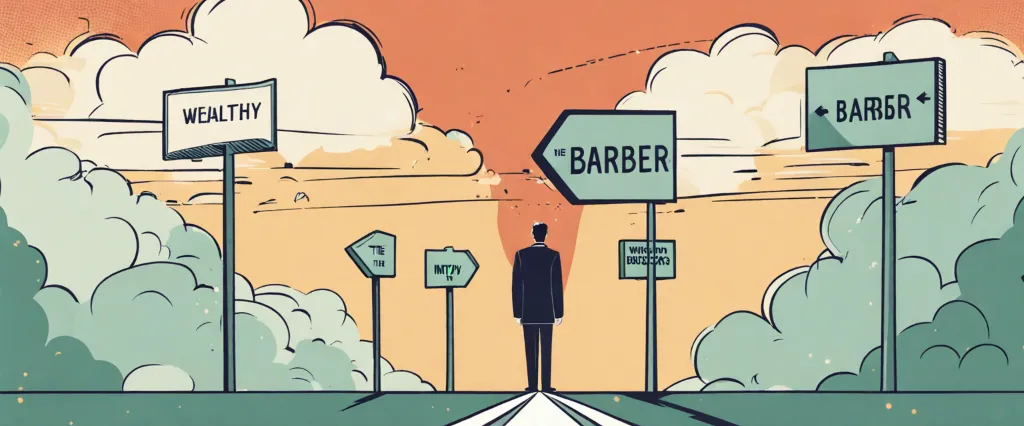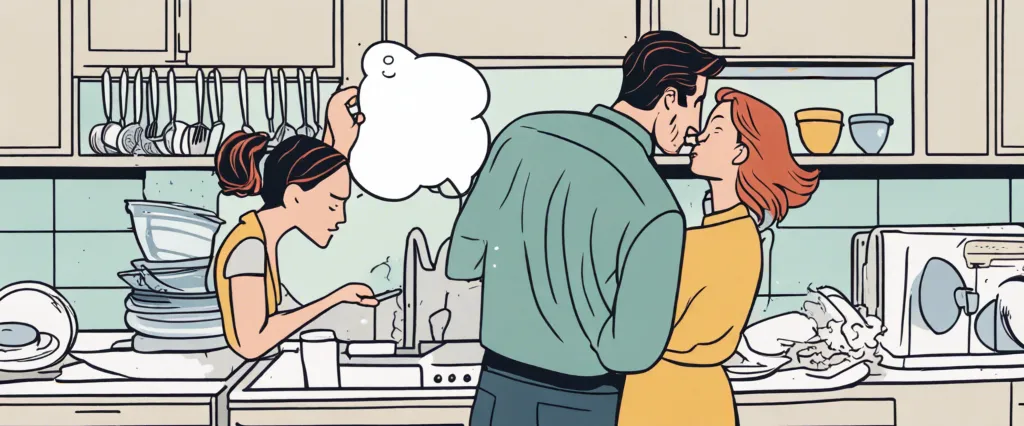——The Wealthy Barber Returns by David Chilton & Its Not You Its the Dishes originally published as Spousonomics by Paula Szuchman

In the realm of personal finance and relationship dynamics, the works of authors David Chilton and Paula Szuchman stand out as insightful guides, offering unique perspectives on two fundamental aspects of our lives: wealth management and partnership dynamics. In “The Wealthy Barber Returns” by David Chilton and “It’s Not You, It’s the Dishes” originally published as “Spousonomics” by Paula Szuchman, these two renowned writers delve into the complexities of finance and relationships, exploring the interplay between money management and marital bliss. While Chilton’s book focuses on unlocking the secrets to financial success, Szuchman’s work takes a lighthearted yet pragmatic approach to understanding the often baffling world of modern relationships. Despite their seemingly disparate subject matter, these books share a common intention— to empower individuals with the knowledge and tools necessary to navigate the intricacies of both their monetary and emotional lives. Through their distinct lenses, Chilton and Szuchman offer unique insights, allowing readers to contemplate and compare the parallels between achieving financial stability and fostering long-lasting, fulfilling relationships.
Brief Summary of Two Books
The Wealthy Barber Returns by David Chilton
“The Wealthy Barber Returns” is a financial guide written by David Chilton, which aims to provide practical advice to help individuals navigate their personal finances and secure their financial future. Chilton, a Canadian author, previously gained acclaim with his first book, “The Wealthy Barber” published in 1989.
In “The Wealthy Barber Returns,” Chilton reprises the character of Roy, the lovable barber, who imparts his wisdom and financial lessons to a new generation of readers. The book is divided into several chapters, each focusing on different aspects of personal finance.
Chilton covers topics such as budgeting, saving, investing, and retirement planning. He emphasizes the importance of avoiding debt and highlights strategies to reduce it if already incurred. The author also delves into the psychology of spending and provides practical tips to curb impulsive buying habits.
One of the key takeaways from the book is the significance of automation in achieving financial goals. Chilton advocates for setting up automatic savings plans and discusses the power of compound interest over time. He also suggests investing in low-cost index funds and diversifying investments to mitigate risk.
In addition to financial advice, Chilton incorporates humorous anecdotes and entertaining stories to keep readers engaged. He encourages readers to prioritize their financial well-being and makes the concepts accessible and relatable to people of all backgrounds and financial literacy levels.
Overall, “The Wealthy Barber Returns” serves as a valuable resource for those seeking to improve their financial literacy and establish a solid foundation for their financial future.
Its Not You Its the Dishes originally published as Spousonomics by Paula Szuchman
“It’s Not You, It’s the Dishes” (originally published as “Spousonomics” by Paula Szuchman) is a self-help book that takes a unique approach to relationships by applying economic principles to everyday marital problems. The author explores how economic strategies and decision-making can be used to improve the dynamics between partners and solve common relationship issues.
The book draws inspiration from the field of behavioral economics, which studies how people make choices and interact with each other. It presents various scenarios and challenges faced by couples, such as household chores, communication problems, sex, and money management. By analyzing these issues through an economic lens, Szuchman provides practical strategies and solutions to improve the overall quality of a relationship.
Some of the key concepts discussed in the book include the idea of trade-offs, where partners negotiate and compromise in order to achieve a fair balance of responsibilities and desires. The author also emphasizes the importance of incentives, highlighting how rewards and motivations can be used to encourage positive behavior within a relationship.
Through relatable anecdotes, scientific research, and real-life examples, Szuchman offers insights and tools to help couples navigate the challenges of married life. The book advocates for open communication, mutual understanding, and applying economic thinking to create a healthier and more harmonious partnership.
Overall, “It’s Not You, It’s the Dishes” is a refreshing take on relationships, providing couples with a new perspective and practical advice based on the principles of economics. The book offers a unique blend of wit, wisdom, and scientific reasoning to help couples build stronger and more fulfilling partnerships.
Comparison between Two Books

Similarities in Money
Both “The Wealthy Barber Returns” by David Chilton and “It’s Not You, It’s the Dishes” (originally published as “Spousonomics”) by Paula Szuchman explore the subject of money and personal finances, providing valuable insights and advice to readers. While each book focuses on different aspects of money management, there are several similarities between them.
1. Importance of budgeting: Both books emphasize the significance of creating a budget and sticking to it. They encourage readers to track their income and expenses, identify areas of overspending, and make necessary adjustments to achieve financial goals.
2. Relationship dynamics: Both books recognize the impact of money on relationships. “The Wealthy Barber Returns” addresses the influence of financial decisions on family dynamics, while “It’s Not You, It’s the Dishes” delves deeper into the connection between money and romantic partnerships. Both books stress the need for open communication, understanding, and compromise when it comes to money matters in relationships.
3. Long-term planning: Both books advocate for long-term financial planning. “The Wealthy Barber Returns” emphasizes the importance of saving for retirement and building a solid financial foundation for the future. Similarly, “It’s Not You, It’s the Dishes” urges readers to consider their long-term financial goals, such as buying a house or starting a family, and make strategic financial decisions accordingly.
4. Debt management: Both books address the issue of debt and offer strategies for effective debt management. “The Wealthy Barber Returns” highlights the significance of reducing and eliminating debt, while “It’s Not You, It’s the Dishes” provides guidance on how to handle joint debts in relationships. Both books emphasize the need for responsible borrowing and smart debt repayment methods.
5. Time value of money: Both books touch upon the concept of the time value of money. They stress the importance of investing early and consistently to take advantage of compounding interest and grow one’s wealth over time.
6. Financial education: Both books emphasize the importance of financial literacy and self-education. They encourage readers to educate themselves about personal finance, learn about investment strategies, and seek professional advice when necessary.
Overall, while “The Wealthy Barber Returns” and “It’s Not You, It’s the Dishes” approach money management from different angles, they share common themes such as budgeting, long-term planning, debt management, relationship dynamics, and the importance of financial education. Both books provide readers with practical advice and insights to improve their financial well-being.
Divergences in Money
“The Wealthy Barber Returns” by David Chilton and “It’s Not You, It’s the Dishes” originally published as “Spousonomics” by Paula Szuchman are two books that offer different perspectives on money and personal finances. While both books provide insights and advice on managing money, they approach the topic from contrasting angles.
1. Tone and Writing Style:
– “The Wealthy Barber Returns” maintains a more traditional, instructional tone, presenting financial principles and strategies in a straightforward manner.
– On the other hand, “It’s Not You, It’s the Dishes” takes a more conversational and lighthearted approach, incorporating anecdotes and humor to address money-related conflicts within relationships.
2. Focus:
– “The Wealthy Barber Returns” primarily focuses on personal finance and wealth-building. Chilton emphasizes the importance of budgeting, saving, investing, and planning for retirement.
– In contrast, “It’s Not You, It’s the Dishes” explores the intersection of money and relationships. It delves into the dynamics between couples and how money can affect their interactions, decision-making, and overall happiness together.
3. Structure:
– Chilton’s book is structured more conventionally, organized into chapters that cover different aspects of personal finance. The narrative flows logically, building upon concepts as the reader progresses through the book.
– “It’s Not You, It’s the Dishes” follows a narrative structure, using real-life examples and stories to illustrate various financial situations within relationships. The book showcases different scenarios and offers solutions based on economic principles.
4. Financial Strategies:
– “The Wealthy Barber Returns” focuses on long-term financial planning and offers practical tips for saving, investing, and building wealth over time. Chilton discusses the importance of compound interest, creating an emergency fund, and avoiding unnecessary debt.
– “It’s Not You, It’s the Dishes” approaches money management within relationships, examining the dynamics of income, division of labor, and decision-making. Szuchman explores the idea of “spousonomics,” applying economic theories to improve financial cooperation and communication between partners.
5. Audience:
– “The Wealthy Barber Returns” targets a general audience, offering fundamental financial advice that applies to individuals of all backgrounds and life stages.
– “It’s Not You, It’s the Dishes” focuses more on couples and relationships, making it particularly relevant to those in committed partnerships or marriages, as it addresses the financial challenges that coincide with shared finances.
In summary, while both books touch on money management, “The Wealthy Barber Returns” is more focused on personal finance and long-term strategies for wealth accumulation, while “It’s Not You, It’s the Dishes” dives deeper into the interplay between money and relationships. The former provides practical advice for individual financial success, while the latter aims to improve financial cooperation within couples.

Conclusion
Deciding which book is more worthy of reading ultimately depends on personal interests and preferences. Both “The Wealthy Barber Returns” by David Chilton and “It’s Not You, It’s the Dishes” (originally published as “Spousonomics”) by Paula Szuchman offer valuable insights and information, but they cover different topics.
“The Wealthy Barber Returns” is a personal finance book that provides advice on managing money and building wealth. It offers practical tips on budgeting, saving, investing, and making sound financial decisions. This book is suitable for individuals who want to improve their financial literacy, take control of their finances, and work towards achieving long-term financial security.
“It’s Not You, It’s the Dishes” (originally published as “Spousonomics”) focuses on relationships and the economics of marriage. It explores how economic principles can be applied to improve communication, decision-making, and the overall understanding between partners. This book is ideal for individuals in a committed relationship who want to enhance their relationship dynamics, solve common household conflicts, and achieve mutual understanding.
Ultimately, if you are looking to improve your financial literacy and wealth-building skills, “The Wealthy Barber Returns” by David Chilton is the more appropriate choice. However, if you are interested in enhancing your relationship dynamics and understanding the economic aspects of marriage, “It’s Not You, It’s the Dishes” (originally published as “Spousonomics”) by Paula Szuchman would be the recommended option.


